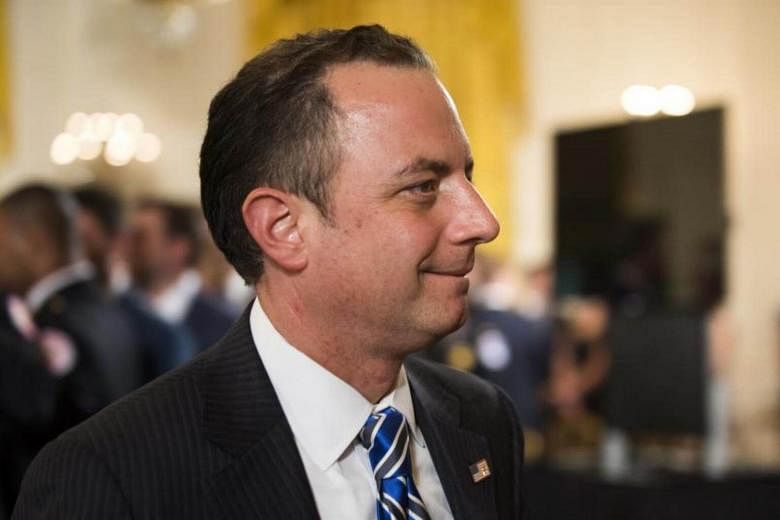WASHINGTON (NYTIMES) - Reince Priebus was ousted Friday (July 28) as President Donald Trump's chief of staff, after weeks of speculation about his status within the White House.
His departure culminated in a very public display of a rivalry with the new White House communications director, Anthony Scaramucci.
The relationship between Priebus and Trump - one a creature of the Republican establishment who rarely speaks in definitives, the other a Manhattan outsider famous for his brash language - goes back much farther than is widely known.
Here is a look at some of the milestones in their shared past to help explain their current status.
One of the few early supporters in Trump's corner
Trump had only a small team of supporters when, in 2011, he first began toying with the idea of a presidential run. Priebus, who at the time had tried unsuccessfully to make inroads into Mitt Romney's 2012 presidential campaign, was one of the few Republicans to take the reality television star seriously.
They were divided on a major aspect of Trump's early public platform, however. The "birther movement" that accused President Barack Obama of having a fraudulent birth certificate played a large role in growing Trump's name recognition across the country, especially in conservative corners. Priebus never agreed with the strategy of questioning whether Obama was a natural-born US citizen.
After Trump announced he would not run in 2012, the two men stayed in touch. Priebus was already serving as chairman of the Republican National Committee and saw an opportunity to make the real estate mogul a high-dollar supporter of the party.
Descending into the 2016 cycle
Several years later, when Trump was again considering a presidential run, he consulted Priebus for guidance. As chairman of the national committee, Priebus had the bureaucracy of the Republican establishment backing him up and the lessons of the 2012 campaign in his head.
On June 16, 2015, the first day of Trump's campaign, those lessons learned - that the party needed to persuade voters that Republicans were not narrow-minded and out of touch - were put in sharp contrast with Trump's own message.
"When Mexico sends its people, they're not sending their best," Trump said, calling for the construction of a border wall.
He added, "They're sending people that have lots of problems and they're bringing those problems with us. They're bringing drugs. They're bringing crime. They're rapists. And some, I assume, are good people."
Months later, after speculation that Priebus had tried to lecture the then-candidate over his anti-immigrant rhetoric, Trump flatly denied that any such conversation had happened. Priebus, he said, "knows better than to lecture me." He added, "We're not dealing with a five-star Army general."
Weathering the ups and downs of the campaign
As party chairman, Priebus was expected to be a strategist for the Republican presidential nominee. He rode many of the waves of a campaign cycle as a result - and there was no shortage with Trump.
For one thing, Priebus was among the advisers who had to persuade Trump not to drop out of the presidential debates. Trump had grown leery of such forums after a contentious exchange he had with Fox News moderator Megyn Kelly during a debate on Aug. 6, 2015. After the debate, Trump accused Kelly of being unfair to him and insinuated that she was menstruating.
The next month, after a lot of lobbying by Priebus, Trump agreed in September 2015 to sign a pledge declaring that if he were to lose the Republican primary election he would not run as an independent.
And Priebus was thrilled when Trump tapped Gov. Mike Pence of Indiana to be his running mate. But the Republican ticket found itself, two weeks later, again on the defensive when Trump derided Khizr Khan, the father of a Muslim soldier who was killed in Iraq.
The "Access Hollywood" tape
One seminal moment in the Trump campaign altered the relationship between the two men for the worse - and it never fully recovered. It came after The Washington Post published an excerpt from an "Access Hollywood" tape, in which Trump bragged about groping women. Surfacing just weeks before Election Day, a public outcry grew for Trump to drop out of the race.
Priebus went to Trump Tower and suggested the candidate consider the possibility of exiting the race. The future president - who values complete loyalty - would never forget the exchange.
Even so, Trump brought on Priebus as White House chief of staff - a chief aide who essentially serves as the president's right-hand man for running the government. It was widely seen as a move to ensure that the Republican establishment would remain in Trump's corner.
Downfall over the past few weeks
The weeks leading to Friday's announcement on Twitter that Trump was ousting Priebus and tapping John Kelly as chief of staff were full of failed policy attempts. They included public White House feuds - which the president himself fueled with tweets against his attorney general - and, more significantly, the failed drive to repeal the Affordable Care Act.
Sean Spicer, the White House press secretary who was close to Priebus, resigned the day that the president announced he had hired Scaramucci to run the communications office.
The president became convinced that Priebus was not strong enough to run the White House operation and told him two weeks ago that he wanted to make a change, according to White House officials. Intrigued at the idea of putting a general in charge, Trump offered the job to Kelly.

